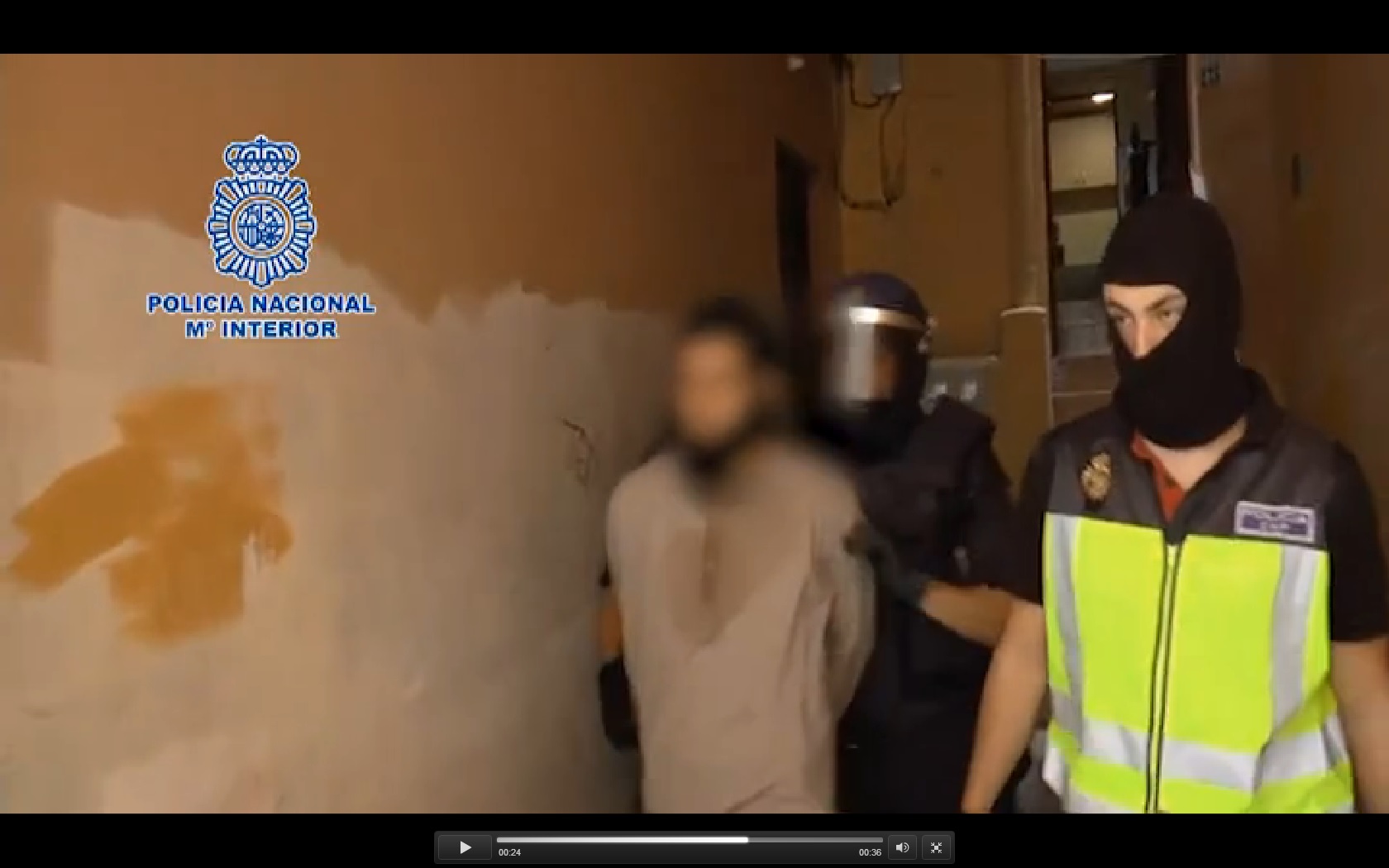
Spain Grapples with Growing Islamic State Threat
Publication: Terrorism Monitor Volume: 12 Issue: 22
By:

A recent report by the UN Security Council estimated that 15,000 people from over 80 countries have so far travelled to Syria and Iraq to fight alongside the Islamic State organization and other extremist groups, “including… [from] countries that have not previously faced challenges relating to al-Qaeda” (The Guardian, October 30). One of these affected countries is Spain. On October 27, Spain’s Ambassador to NATO, Miguel Aguirre de Cárcer y García del Arenal, said, “The Islamic State with its barbaric and terrorist tactics, now presents the most serious threat to our society” (LaInformacion.com, October 27). Separately, the Spanish foreign minister, José Manuel Garcia-Margallo, said during an interview in October: “There is a risk that a jihadist corridor stretching from the Atlantic to the Indian Ocean will be created” (El Correo, October 19).
Although Spain’s Islamic State volunteers are less well-documented that from those from some other European countries, a number of separate but related threats are emerging. These include the danger posed by local terrorist cells and lone wolves inspired by al-Qaeda’s global jihadist ideology with no direct ties to terrorist groups, Islamist radicals who return home to Spain after undergoing instruction in combat zones, cells aligned with al-Qaeda in the Islamic Maghreb (AQIM) and finally, extremists who have been released from the U.S. military’s Guantanamo Bay prison to return to Spain. Spain, however, is no stranger to Islamist terrorism and for some years has given a high priority to tackling jihadism; since 1995, according to the Spanish Interior Ministry earlier this year, Spanish security forces have arrested 472 suspected Islamists (Auditor Barcelona, March 10). Spain has also been directly targeted by Islamist militants previously; notably the March 11, 2004 Madrid train bombings (also known in Spain as 11-M) killed 191 people and injured more than 2,000. In addition, the Spanish government is aware, that given Spain’s history, it occupies a unique place in the jihadist worldview; speaking on the tenth anniversary of the 2004 bombings, Spanish Interior Minister Jorge Fernández Díaz said: “Clearly Spain forms part of the strategic objectives of global jihad. We are not the only ones, but we are in their sights” (Grupo Milenio, March 14).
Numbers
In September 2013, Spain’s CNI intelligence service reported that it had identified 95 people from Spain – 13 nationals and the rest Moroccans with Spanish residency papers from six different cities – who had travelled to Syria since the civil war broke out to join al-Qaeda in fighting the Syrian government. Of these, it said that at least 11 had died as suicide bombers. In particular, CNI identified three residents of Ceuta who died as suicide bombers in Syria. These included Rawhid al-Wahbi, who crashed a bomb-laden truck into a government military headquarters, reportedly causing 130 deaths, and Mustafa Muhammad Layachi and Mustafa Muhammad, who also died in suicide bombings (El País, January 26). The number of both active jihadists and fatalities is now likely to be considerably higher, although precise numbers remain unclear. For instance, on July 19, Spanish National High Court Prosecutor and Coordinator on International Terrorism Dolores Delgado said that the Spanish security agencies had identified 29 Spaniards currently fighting in Syria, although she said that the figure could be higher because others may not have been located (EFE, July 19).
According to the available evidence, most Spanish jihadists active in Syria came from Catalonia, Madrid, Málaga, Alicante, Ceuta and Melilla, with one anti-terrorism officer commenting to the media, on condition of anonymity, that “almost all of them went with the firm determination not to come back, according to their friends” (El País, September 18, 2013). According to the Spanish intelligence services, most Spanish Muslims fighting in Syria are of Spanish origin, being either second or third generation immigrants, or were born abroad and are legal residents in Spain. In addition, the Moroccan authorities have said that an estimated 1,200 Moroccans holding Spanish residency cards have joined the Islamic State organization (El País, August 25, 2013). This echoes previous experience of the issue; police analysts have reportedly found in the last decade that the greatest number of Islamists are concentrated in Catalonia, Granada, Valencia, La Rioja and Madrid (El País, March 10).
In addition, the networks that recruit Spanish Muslims to join the Islamic State organizaton are also becoming clearer. In August 2013, Spain’s Interior Ministry reported that 60 Spaniards had been recruited by networks operating within Spain (El País, August 25, 2013). The Spanish media has also reported that most volunteers have travelled to Syria via Turkey, as well as through Bulgaria, Greece and Tunisia, echoing broader patterns of Western European recruitment (La Vanguardia, July 19).
Arrests
According to a September Ministry of Interior report, the number of arrests for terrorism-related jihadist activities in Spain has grown significantly since 2013, with 44 people taken into custody in Spain, Ceuta and Melilla in the year to date. By contrast, during the entire 2001-2013 period, Spanish security forces arrested a total of 78 individuals (ABC, September 26). The increase in arrests reflects that the Spanish government is increasingly worried about the return of jihadists from Syria and Iraq and their potential plans for attacks in Spain itself, as well as reflecting that the number of active militants is also increasing. However, the Spanish authorities have admitted that they have only a partial picture. A senior official in Spain’s intelligence service, speaking on condition of anonymity, told the media in March that “we do not know how many went and how many returned. That is the danger, not knowing everything that we should know. Nobody is able to give reliable figures” (El País Internacional, March 25). There are also increasing fears that some of the militants are preparing to target Spain directly. According to Spanish terrorism expert José María Gil Garre, Spanish jihadists integrated into the Islamic State organization are now openly threatening to commit attacks on Spanish soil after returning from Syrian-Iraqi conflict zones, stating that their targets will include “churches,” “local government councils” and “police stations” (Agencia Europa Press, September 28).
One on the most high profile series of arrests occurred on June 16, when the Spanish security forces arrested eight people in Madrid during a raid against an international network that was suspected of recruiting jihadists for the Islamic State. The recruitment organization was led by 47-year-old Moroccan national Lahcen Ikassrien, a former detainee at Guantanamo Bay prison (El País, June 16). Ikassrien had been arrested in Afghanistan in December 2001 and transferred to Guantanamo, where he was held until he was transferred to Spain’s Torrejón de Ardoz military base in July 18, 2005. He was accused by the U.S. and Spanish prosecutors of cooperating with al-Qaeda; however, Spain’s High Court acquitted him in 2006 due to a lack of evidence (El País, November 20, 2006). Ikassrien, who had been living in Madrid, had also been linked to a cell led by Imad Eddin Barakat Yarkas, alias Abu Dahdah (El País, March 10). Dahdah, a Syrian-born Spanish citizen, had also been previously arrested in November 2001 and had been sentenced to a 27-year prison term in Spain for his part in the September 11, 2001 terrorist attacks in the United States and for his membership of al-Qaeda. Dahdah’s sentence was subsequently reduced by the Spanish Supreme Court after it ruled that conspiracy charges against Dahdah were unproven. After serving 12 years, Dahdah was accordingly released on May 22, 2013 (EFE, May 23, 2013). The United States, however, had continued to include Dahdah on its blacklist of known al-Qaeda terrorists, alleging that Dahdah knew of the planned September 11 attacks and was deeply involved in their organisation. [1]
Government Response
In response to the Islamic State organization’s expansion in Iraq and Syria, Spain has adopted a proactive stance. On October 10, Spain’s Minister of Defense Pedro Morenés announced that the country’s Council of Ministers had approved sending around 300 soldiers to Iraq to train the Iraqi army for an initial period of six months, focusing on handling explosives, demining and special operations (El Mundo, October 10). The following week Morenés visited U.S. Secretary of Defense Chuck Hagel at the Pentagon, where, among other topics, they discussed ongoing counter-Islamic State efforts, including Spain’s role in the anti-Islamic State coalition. [2] The next day Morenés announced that while Spain had ruled out taking part in ground operations in Syria, and reiterated its intention to begin training Iraqi forces in the near future, telling reporters: “We could be starting up by the end of this year because the whole operation is evolving fast, all the time, every day; we have to adjust our abilities and what we are offering, in response to that evolution” (El Mundo, October 18).
Some among Spain’s million strong Muslim population have also spoken out against the Islamic State. On September 4, Riay Tatary Bakry, Syrian-born president of the Union of Islamic Communities of Spain/Islamic Commission of Spain, issued a press release, entitled “The hijacking of grandiose words by extremists.” In the statement, Tatary said:
Outlook
A decade after the 2004 Madrid bombings, Spain continues to grapple with the threat of Islamist terrorism as increasing evidence emerges of the Islamic State organization successfully recruiting Spanish Muslims. In attempting to tackle this issue, Spain faces some unique challenges. In particular, the proximity of Spain to Morocco and its Ceuta and Melilla North African enclaves allow jihadists extensive freedom of movement, greatly complicating the efforts of Spanish security forces. In addition, as some observers have noted, in order effectively to combat the Islamic State, Spain will accordingly have to integrate its counter-terrorism policies with Morocco; as Gil Garre observed: “Morocco and Spain have to face this challenge together because the threat is the same, the level of risk is similar and many of the returnees have ties (with both nations) and are linked” (Red Marruecos, March 22). An additional challenge, as some of the above government statements illustrate, is that Spain – not withstanding its extensive counter-terrorism capabilities – faces considerable challenges in identifying and tracking Islamic State recruits, and that compared to many other European counties, its counter-radicalisation capabilities remain relatively undeveloped.
Dr. John C. K. Daly is a Eurasian foreign affairs and defense policy expert for The Jamestown Foundation and a non-resident fellow at the Central Asia-Caucasus Institute in Washington DC.
Notes
1. Fernando Reinares, “The Evidence of Al-Qaida’s Role in the 2004 Madrid Attack,” CTC Sentinel, March 2012, https://www.ctc.usma.edu/posts/the-evidence-of-al-qaidas-role-in-the-2004-madrid-attack.
2. Readout of Secretary of Defense Chuck Hagel’s Meeting with Spain’s Minister of Defense Pedro Morenés, Department of Defense Press Release, October 17, 2014, https://www.defense.gov/Releases/Release.aspx?ReleaseID=16985.
3. “El secuestro de las grandes palabras por los extremistas,” Unión de Comunidades Islámicas de España /Comisión Islámica de España, Madrid, September 4, 2014, https://ucide.org/es/content/el-secuestro-de-las-grandes-palabras-por-los-extremistas.





